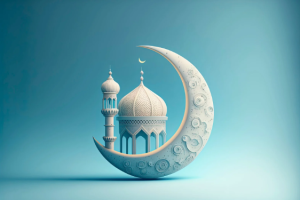الى متى رمضان؟
رمضان هو شهر مبارك في التقويم الإسلامي، يعتبر أحد أهم الشهور في الإسلام ويتميز بفريضة الصوم التي يتبعها المسلمون حول العالم. يُعد رمضان فرصة للمسلمين للتأمل الروحي وتعزيز القرب من الله وتحقيق الانقضاض على النفس والتطهر الروحي. في هذا المقال، سنتناول بالدراسة مدة صيام شهر رمضان، وأهميته في الإسلام.
مدة رمضان:
رمضان هو شهر من التقويم الإسلامي الذي يستمر لمدة تصل إلى 30 يومًا، ويعتبر تحديد مدة رمضان وفقًا للتقويم الهجري يعتمد على رؤية هلال شهر شوال الذي يأتي بعد رمضان. وفقًا للعقيدة الإسلامية، فإن الله قد ورد في القرآن الكريم: “شَهْرُ رَمَضَانَ الَّذِي أُنزِلَ فِيهِ الْقُرْآنُ هُدًى لِّلنَّاسِ وَبَيِّنَاتٍ مِّنَ الْهُدَىٰ وَالْفُرْقَانِ” (البقرة: 185)، مما يعني أن رمضان هو الشهر الذي نزل فيه القرآن الكريم كهدى وهدف للبشرية، ويُعتبر القرآن الكريم كتاب المسلمين الذي يحتوي على الإرشادات الروحية والتوجيهات الدينية التي تُعد دليلًا للمسلمين في الحياة اليومية، ولهذا يعتبر رمضان شهرًا مميزًا بالنسبة للمسلمين.
تاريخ رمضان:
تعود أصول صيام رمضان إلى العصور القديمة، وكان النبي محمد صلى الله عليه وسلم هو الذي بدأ بتعيين رمضان كشهر للص
والصيام. ووفقاً للتاريخ الإسلامي، فإن النبي محمد صلى الله عليه وسلم تلقى الوحي من الله في ليلة القدر في رمضان، وهي ليلة تُعد من أكثر الليالي المباركة في الإسلام. تُعد رمضان فرصة للمسلمين لاستدراك الأوقات الضائعة والاعتكاف والصلاة والذكر والتسبيح وقراءة القرآن الكريم، وتعزيز الروحانية والتأمل في الدين والحياة.
أهمية رمضان:
رمضان يُعتبر أحد الشهور العظيمة في الإسلام، وله العديد من الأهميات الدينية والاجتماعية والصحية والروحية، ومن أهم هذه الأهميات:
فرضية الصوم: يعد الصوم في رمضان فرضًا دينيًا على كل مسلم بالغ عاقل وقادر صحيًا، ويعتبر من أركان الإسلام الخمسة. يقوم المسلمون بصوم الشهر الكريم من الفجر حتى غروب الشمس، حيث يمتنعون عن تناول الطعام والشراب والجماع الجنسي والتدخين وغيرها من الأعمال التي تُعد مفطرة. يعتبر الصوم تجربة دينية وروحية للمسلم، حيث يتعلم الصبر والتحكم في النفس والرغبات، ويزيد من التأمل والتقرب إلى الله.
تطهير الروح والجسد: يُعتبر رمضان فرصة لتطهير الروح والجسد، حيث يقوم المسلمون بترك السيئات والمعاصي والتفكير في الخير والعمل الصالح. وبفضل امتناع المسلمين عن الطعام والشراب طوال النهار، يتم تنقية الجسد وإزالة السموم، مما يُساهم في تحسين الصحة العامة وتعزيز الوعي الصحي.
How long is Ramadan?
Ramadan is a blessed month in the Islamic calendar. It is considered one of the most important months in Islam and is marked by the obligation of fasting followed by Muslims around the world. Ramadan is an opportunity for Muslims to meditate spiritually, enhance closeness to God, and achieve self-discipline and spiritual purification. In this article, we will study the duration of the month of Ramadan fasting, and its importance in Islam.
Ramadan Duration:
Ramadan is a month of the Islamic calendar that lasts for up to 30 days, and determining the duration of Ramadan according to the Hijri calendar depends on the sighting of the crescent of the month of Shawwal, which comes after Ramadan. According to Islamic belief, God has been mentioned in the Holy Qur’an: “The month of Ramadan in which the Qur’an was revealed as a guidance for people and clear proofs of guidance and the Criterion” (Al-Baqara: 185), which means that Ramadan is the month in which the Holy Qur’an was revealed, and the Qur’an is intended for mankind as a guidance. The Book of Muslims, which contains spiritual guidance and religious directives that are a guide for Muslims in their daily life, and that is why Ramadan is a special month for Muslims.
Ramadan date:
The origins of Ramadan fasting go back to ancient times, and it was the Prophet Muhammad, peace be upon him, who began designating Ramadan as the month for the thief And fasting. According to Islamic history, the Prophet Muhammad, peace be upon him, received a revelation from God on Laylat al-Qadr in Ramadan, which is one of the most blessed nights in Islam. Ramadan is an opportunity for Muslims to catch up on lost times, perform i’tikaaf, pray, remembrance, praise, read the Holy Qur’an, promote spirituality, and reflect on religion and life.
The importance of Ramadan:
Ramadan is considered one of the great months in Islam, and it has many religious, social, health and spiritual significances, the most important of which are:
The hypothesis of fasting: Fasting in Ramadan is a religious obligation for every sane and able adult Muslim who is healthy, and is considered one of the five pillars of Islam. Muslims fast the holy month from dawn until sunset, during which they abstain from eating, drinking, sexual intercourse, smoking, and other acts that are considered to break the fast. Fasting is a religious and spiritual experience for a Muslim, as it teaches patience and self-control and desires, and increases meditation and closeness to God.
Purification of the soul and body: Ramadan is considered an opportunity to purify the soul and body, as Muslims abandon bad deeds and sins and think about goodness and good deeds. Thanks to Muslims abstaining from food and drink throughout the day, the body is purified and toxins removed, which contributes to improving public health and promoting health awareness.



